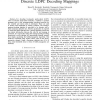Free Online Productivity Tools
i2Speak
i2Symbol
i2OCR
iTex2Img
iWeb2Print
iWeb2Shot
i2Type
iPdf2Split
iPdf2Merge
i2Bopomofo
i2Arabic
i2Style
i2Image
i2PDF
iLatex2Rtf
Sci2ools
112
click to vote
GLOBECOM
2008
IEEE
2008
IEEE
Noise Thresholds for Discrete LDPC Decoding Mappings
— For decoding low-density parity-check (LDPC) codes on discrete memoryless channels, a method to quantize messages and to find message-passing decoding functions for the variable and check nodes is developed. These are used to obtain noise thresholds by density evolution. The messagepassing decoding alphabet is restricted to be discrete with a fixed maximum alphabet size. Discrete quantization is required to obtain this fixed alphabet size; a greedy algorithm which uses the mutual information between the code bit and message is presented. It is argued that using this message-passing decoding framework is more efficient for approaching channel capacity than simply quantizing the belief-propagation algorithm. This method is evaluated using regular LDPC codes on the binary symmetric channel. Using a maximum alphabet size of 16 (4 bits), noise thresholds close to those of belief propagation are obtained.
Alphabet Size | GLOBECOM 2008 | Maximum Alphabet Size | Message-passing Decoding Functions | Telecommunications |
Related Content
| Added | 29 May 2010 |
| Updated | 29 May 2010 |
| Type | Conference |
| Year | 2008 |
| Where | GLOBECOM |
| Authors | Brian M. Kurkoski, Kazuhiko Yamaguchi, Kingo Kobayashi |
Comments (0)

